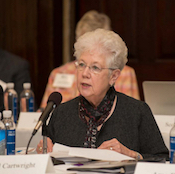- Photos – link here
- Audio – link here
- Videos available:
Washington, D.C. – On the eve of a critical vote by the NCAA, the Knight Commission on Intercollegiate Athletics today urged passage of a new policy that would, for the first time, provide financial awards to schools that meet academic expectations for sports teams and athletes. During its fall meeting at the Newseum, the Commission also encouraged the NCAA to adopt policies under consideration that would reduce athletic time demands on college athletes.

“With more money flowing into college sports, it is even more critical to ensure educational values are supported by meaningful financial rewards—and not just by words alone,” said Brit Kirwan, chairman of the Knight Commission.
Under the NCAA’s current revenue distribution formula, nearly 40 percent of the annual $550 million payout for March Madness is awarded based on the success of men’s basketball teams in the tournament. But under the proposal the NCAA will vote on in three days (Thursday), more than $10 million and eventually more than $100 million of the media revenues from the March Madness tournament would be awarded to schools whose athletic teams meet academic-based criteria. The Commission also urged leaders of the College Football Playoff (CFP) to adopt the same NCAA academic-based criteria for a portion of the CFP distributions.
At today’s meeting, several panelists stressed that the NCAA must build on progress that has been made with recent rule changes to improve the student experience and treat athletes fairly. Shane Battier, a former star basketball player at Duke, argued that reducing time demands on college athletes was important to free up time for them to focus on earning their degrees and enjoy the college student experience.
Battier said there’s been a “troubling trend in college basketball” of players being over-scheduled, adding that its becoming a 24/7 job. He contrasted that with his time at Duke, when he had the free time to play Wiffle ball and engage in other leisure activities. Schools need “to do a better job of letting students be students,” Battier said.

Battier, Jones, and panelist Trey Burke, who plays for the Washington Wizards, and Atlantic-10 Conference Commissioner Bernadette McGlade agreed that leaders should continue to consider whether college athletes in high-revenue generating sports are treated fairly, including with the use of their names, images and likenesses and the maximizing of career development opportunities.
During the meeting, the Knight Commission also heard presentations from athletic directors and other leaders on financial issues, including the need to address unsustainable athletics spending and focus their expenditures on the college athletes’ student experience. The Commission presented financial information that showed the five highest-resourced conferences increased their revenues by more than 250 percent over the past decade.
Despite the revenue increase at their conferences and institutions, Karen Weaver, associate clinical professor, sport management, at Drexel University, warned that with increasing cord-cutting among those under the age of 25, schools may not be able to bank on the assumption that traditional media rights deals will continue to rise for their conference or league.
University of Idaho President Chuck Staben discussed the financial pressures that contributed to his university’s decision to change its football affiliation from the Football Bowl Subdivision (FBS) to the Football Championship Subdivision (FCS). Staben said the change is “not a financial cure-all but it does insulate us from a financial arms race.”
The Commission continues to encourage the NCAA, conferences and schools to prioritize athletes’ education and provide more protections and benefits for their health and safety in the allocation of its financial resources.
The Commission also encourages university leaders, trustees, media and the public to use its public database on athletic and academic spending for Division I public schools as a resource to understanding spending trends and investments in Division I athletics.
The Commission updated a graphic showing where the money comes from and where it goes in NCAA Division I college sports, and how conference revenues have changed.
Today’s meeting was the final one for Knight Commission Chair Kirwan. Starting next year, the Commission will be co-chaired by Carol Cartwright, president emeritus, Kent State University, and Arne Duncan, former U.S. Secretary of Education.
About the Knight Commission on Intercollegiate Athletics
The Knight Commission was formed by the John S. and James L. Knight Foundation in October 1989 to promote reforms that support and strengthen the educational mission of college sports. Over the years, the NCAA has adopted a number of the Commission’s recommendations, including the rule that requires teams to be on track to graduate at least 50 percent of their players to be eligible for postseason competition. The Commission’s Athletic and Academic Spending Database provides financial data for more than 220 public Division I institutions, creating greater financial transparency on athletics spending.
About the John S. and James L. Knight Foundation
The Knight Foundation supports transformational ideas that promote quality journalism, advance media innovation, engage communities, and foster the arts. We believe that democracy thrives when people and communities are informed and engaged. For more, visit www.knightfoundation.org.
Photos
